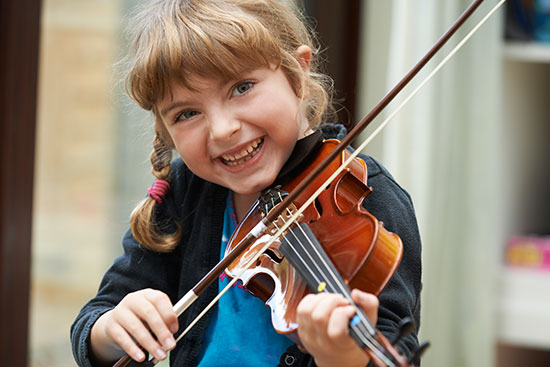By John Salak —
Want healthy, happy, smart kids who live long and productive lives? Start with making sure they are physically active, emotionally secure and enveloped in music from their earliest years—at least that’s what three recent studies are recommending.
McMaster University in Canada reports several health benefits of music for children including that a fair amount of physical activity in preschoolers will help children avoid heart diseases later in life. The research, which tracked the physical activities of hundreds of individuals over many years, found that active preschoolers tended to have fewer cardiovascular problems later in life.
The study reported that regular activity in children as young as three enhances blood vessel health and cardiovascular fitness, which are critical to preventing heart problems later on.
“It’s important to start any kind of preventative measures early,” explained Nicole Proudfoot, the study’s lead author. “We need to ensure small children have many opportunities to be active to keep their hearts and blood vessels as healthy as possible.”
And it wasn’t just the amount of activity but the intensity of a child’s activity that determined their long-term health, McMaster reported.
Music to their ears takes on a whole new meaning for kids. Research indicates it’s like brain food to young children. Everyone should like the sound of that.
The University of Southern California added its own take on healthy childhood development by noting music is more than just entertainment for young children. USC’s Brain and Creativity Institute determined that exposure to music and music instruction helps brain development, particularly in the areas of language development, reading skills and speech perception.
The two-year study of 37 children between the ages of 6 and 7 years old found that those children who were exposed to music recorded stronger brain development than children enrolled exclusively in a soccer program or those involved in neither sports nor music.
The results were based on comparing the electrical activity in their brains, behavioral testing and monitoring shifts in brain scans of the different groups.
The research found that the auditory systems of the children exposed to music accelerated faster than those without access to music. Music apparently stimulates the auditory system, which is an essential factor in enhancing reading skills, developing language proficiencies and learning to communicate successfully, USC concluded.
Research out of Loma Linda University Health offered another glimpse into successful childhood development patterns, noting that unsupportive parenting styles may have a negative health impact on a child that extends into their adult years.
Children of mothers with unsupportive or “cold” parenting skills had less protection of their DNA strands, Loma Linda noted. This was determined by measuring the telomeres or protective caps on DNA strands. Those children (and later adults) who considered their mothers’ parenting style to be “cold” had telomeres that were 25 percent smaller on average than individuals with mothers deemed to be “warm.”
This is a significant connection because early-life stress is linked to shorter telomeres, which can also lead to accelerated cellular aging and increased risk of disease later in life.
“Telomeres have been called a genetic clock, but we now know that as early life stress increases, telomeres shorten and the risk of a host of diseases increases, as well as premature death,” reported Raymond Knutsen, the study’s lead author.
Loma Linda also found a correlation between cold parenting styles and education levels, weight gains and continued obesity, suggesting that higher education and healthy weight levels may help prevent cold parenting and cellular aging.












